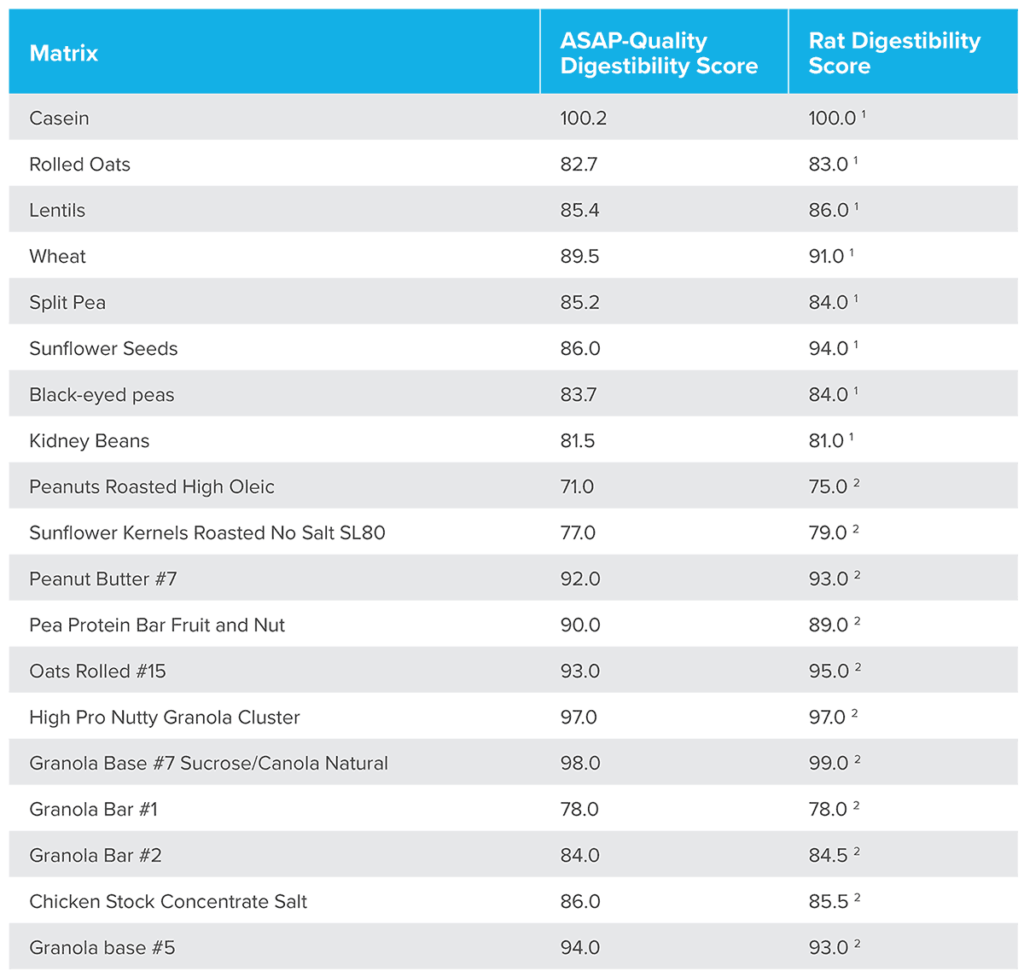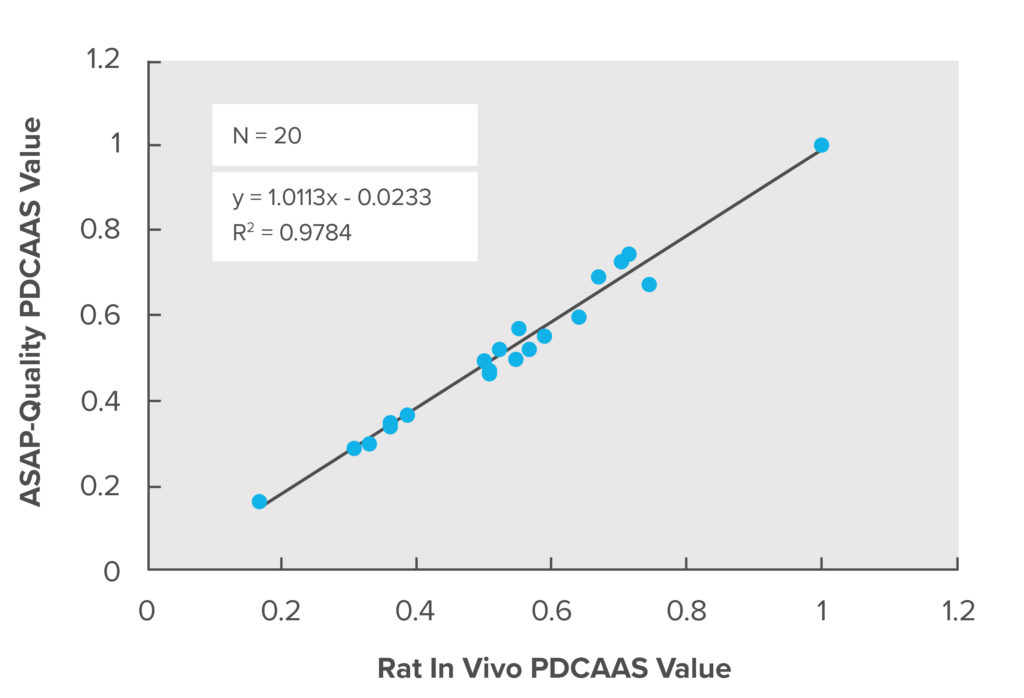Making Protein Digestibility Testing Easier to Swallow

Protein is one of the most vital nutrients within the human diet. Without it, our bodies would not be able to produce enzymes, hormones, or cells; repair damaged tissue; build strong muscles and bones; or maintain healthy skin and blood.
Depending on the source, our bodies will break down protein in different ways and in different parts of our digestive tract. Most proteins begin to break down in the stomach when they make contact with pepsin, the chief digestive enzyme in the stomach. These broken down proteins become peptides, which travel to the small intestine, with the help of enzymes, where they can be broken down into individual amino acids and absorbed into the bloodstream. Once absorbed, our bodies can deliver the amino acids to any part of the body and reconstruct them as needed to keep our bodies healthy and strong.
Protein is a macronutrient, along with fat and carbohydrates, which means our bodies need large amounts of it to sustain us throughout the day. But unlike fat and carbs, our bodies do not store protein. We either use it or lose it.
That’s why any athlete, trainer, or fitness buff will tell you that the best time to take that protein shake is directly before or after your workout. When we exercise, our muscles actually develop small tears (which sounds worse than it is) and our cells rush in to begin repairing them with the help of protein.
What is Protein Digestibility Testing?
Protein digestibility tests help to determine a protein source’s ability to be digested and the ratio of essential amino acids required for human consumption.
Protein Testing
Beef up your product development process with reliable, accurate protein digestibility testing at Medallion Labs.
Connect with us todayWhy is Protein Digestibility Testing Important?
Proteins are made up of complex amino acid chains. Our bodies are able to synthesize some of these, but the ones we cannot are called essential amino acids and we can only absorb these by eating things like animal proteins, dairy products, nuts, and beans.
The reason protein digestibility is so important is that modern farming and food manufacturing have impacted the quality of certain protein sources. Digestibility testing is also important because not all forms of protein are created equal and digestibility differs from one source to the next, so digestibility testing helps to ensure proper nutrition.
How to Test for Protein Digestibility
There are multiple protein digestibility testing methods, but the most common method is the Protein Digestibility Corrected Amino Acid Score (PDCAAS) method, which became the preferred industry method in 1993 at the recommendation of the Food and Agriculture Organization of the United Nations (FAO) and the Food and Drug Administration (FDA).
Protein Digestibility Corrected Amino Acid Score (PDCAAS) method
The PDCAAS method works by comparing the amino acid profile of a specific protein source against the standard amino acid profile of casein. The highest possible score is a 1.0, which means that after the protein is digested it provides 100% of the essential amino acids required for human nutrition.
There are some drawbacks when using the PDCAAS method, including:
- The long turnaround time for results: 2-3 months.
- The average cost per test.
- The common reliance on rats as test subjects, which raises ethical concerns for some food manufacturers and concerns over whether a rat’s digestive system reflects that of a human’s correctly.
Medallion’s ASAP Quality Score method
The ASAP Quality Score developed at Medallion Labs uses the same casein standard as the traditional PDCAAS method, but is able to achieve the same effects in vitro (in a test tube) rather than in vivo (inside a living subject).
The ASAP method offers multiple advantages over the traditional PDCAAS method, including:
- Results are available within 15 days.
- The cost is significantly lower at $1,500 per test.
- Does not rely on or require animal testing.
Correlation of ASAP method scores to Rat PDCAAS scores
The in vitro ASAP method results show excellent correlation to the in vivo rat values. Correlations are greater than 0.97 over a wide range of scores.

1Based on published literature values
2Based on direct analysis of the same sample by both methods

Regulation, Standardization, and Labeling
The Food and Drug Administration (FDA) is responsible for determining the regulations around food labeling. However, the FDA does not identify a daily value for protein unless the product claims to be “high in protein” or is intended for children under the age of 4.
Lack of standardization across industries
There are disagreements over selecting a standardized method for testing protein digestibility because different proteins respond differently to the various tests, meaning one test can provide a higher (more favorable) digestibility score than another.
For example, the FAO has shifted their allegiance to a new method called the Digestible Indispensable Amino Acid Score (DIAAS). The dairy industry favors the DIAAS method because “high-quality proteins, such as the proteins from milk, whey, and other dairy products, may score 30% higher than when using the older method for assessing quality.”
Something to Chew On
You should choose the protein digestibility testing method that meets your needs and provides the most accurate results to help you refine your product, meet regulatory standards, and inform your customers. Current regulations recognize the rat PDCAAS method only for finished products. That being said, the ASAP method is a great tool for R&D and pilot plant studies, saving brands significant time and money and for organizations that have an animal testing moratorium in place, the ASAP method is the perfect option.
Let's Get to Work!
Submit your order online and ship your samples today. If you have questions, we are always here to help.
Medallion Labs+
A food testing program designed with mid-market and enterprise food and ingredient manufacturers in mind.